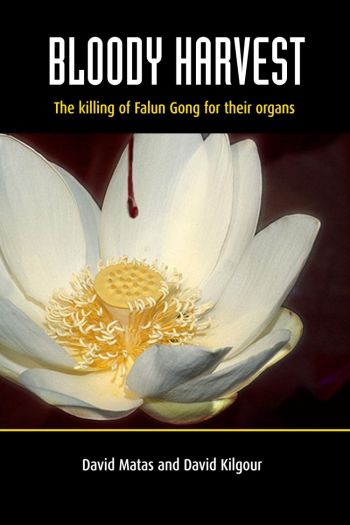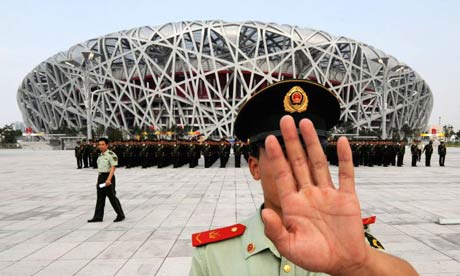Darfur Crisis Sparks Louder Calls For Boycott of Beijing Olympics
Posted by Author on June 25, 2007
By Darren Taylor, VOA News, Washington, 19 June 2007-
As the humanitarian crisis in Darfur continues, calls in the United States and Europe for an international boycott of the 2008 Beijing Olympics because of China’s support of Sudan are intensifying. Human rights activists say the Sudanese government is using a militia, the janjaweed, to “exterminate” the black people of Darfur. They claim that 400, 000 people have lost their lives and more than two million have fled to refugee camps as a result of the violence. The activists say China bears responsibility for the tragedy, given its military and economic support of the Sudanese administration. In the first part of a series on the growing calls for a worldwide boycott of the Chinese Olympics, VOA’s Darren Taylor reports on the reasons behind the targeting of Beijing because of the Darfur conflict.
United States officials, including President George W. Bush, have branded the Darfur situation “genocide” – a characterization that rankles with Khartoum, which claims that only a few thousand people have lost their lives in the region as a result of “tribal disputes” and “rebel attacks.”
According to Salah Elguneid, Sudan’s Deputy Ambassador to the US, the “sudden cries” for action to be taken against China because of Darfur, are happening for the “simple reason” that the word “genocide” is being used to describe what is essentially a “tribal conflict over scarce resources.”
“Through this false description of what is happening in Darfur, irresponsible people are sweeping up feelings and as a result China, Sudan’s close ally, is now also in the middle of the storm,” Salah explains.
As the violence has continued in Darfur, with accompanying images of death and destruction, a powerful, vocal and well-funded advocacy campaign with thousands of members has risen to the fore in America, with off-shoots throughout Europe and stronger efforts to involve activists in Africa and other parts of the developing world.
Sudan has repeatedly balked at allowing a significant force of United Nations peacekeepers into Darfur, despite making numerous agreements that it would do so. Khartoum has agreed to a force of between 20,000 and 25, 000 multinational soldiers for Darfur to protect civilians, and also appears to have agreed that the troops be under UN command. The government of Sudan had previously insisted that the proposed peacekeeping force – agreed to in terms of a special UN resolution – be made up mainly of African Union troops, that it should function under AU command, and that the UN troops should serve mostly in a logistical capacity and not as “active” peacekeepers.
An AU contingent of about 7,000 soldiers in Darfur has been unable to secure peace in the region – largely because the force is overstretched and under-resourced. But Khartoum’s agreement that the peacekeepers be controlled by the UN has opened the way for the troops to be better funded by the international body.
But activists remain skeptical, given Khartoum’s tendency to make agreements – only to fail to implement them.
“Unless we see real, on-the-ground movement to significantly protect the people of Darfur, I’m sure calls like the one for a boycott of next year’s Olympics in China will get louder in the months ahead,” says Anita Sharma, of the Enough Campaign to end the “genocide” in Darfur.
Given Khartoum’s apparent intransigence with regard to ending the atrocities, activist attention has shifted to China, because of the Far Eastern power’s strong economic, military and political ties with Sudan and it’s hosting of a high profile global event next year – the Olympic Games, scheduled to begin in August 2008.
While the calls for an international boycott of the Beijing Olympics are so far only being made by a smattering of American and European politicians, the major advocacy groups around the Darfur crisis have made it clear that they support the increased pressure being brought to bear on China to act as an honest broker in helping to end what the UN has termed the world’s worst humanitarian crisis.
China is Sudan’s most important foreign ally, and is also the country’s major international trade partner. The giant of the Far East has invested heavily in Sudan’s oil industry – financing its oil pipeline, for example – and buys about 400, 000 barrels of Sudanese oil a day. This translates to China purchasing about two-thirds of all the oil produced in Sudan. China also sells weapons and ammunition to Khartoum – in so doing, say activists, oiling the wheels of war in Darfur and directly supporting what they term “genocide.”
Beijing has used its veto on the UN Security Council to weaken resolutions aimed at putting pressure on the administration of President Omar al-Bashir to stop the killings in Darfur. China insisted, for example, that Resolution 1706 – which authorized the UN peacekeeping force to protect civilians – be employed only “with the consent” of Sudan. This led to months of stalling by Khartoum, and an escalation in the violence in Darfur.
Beijing has also condemned US financial sanctions on Sudanese companies designed to pressure al-Bashir with regard to Darfur.
If positive moves to bring peace to Darfur are not witnessed within the next few months, say the activists, there’s a strong possibility that they’ll join the calls for a global boycott of the Chinese Games.
“We want action, not endless agreements,” says Sharma.
Already, activists throughout the US and Europe have termed the Beijing event the “Genocide Olympics” and have spent hundreds of thousands of dollars on international advertising campaigns highlighting China’s alleged fomentation of the Darfur conflagration.
In late May, the Save Darfur Coalition placed advertisements in major newspapers around the world – including in several Chinese-language newspapers in Asia, and spotlighted China’s “unique position to pressure the Sudanese government into stopping the bloodshed and allowing United Nations peacekeepers into Darfur to protect civilians.” The Save Darfur adverts underscored the fact that China is “happy” to emphasize its “beneficent role” as host of the 2008 Olympics – but not its support of a “regime engaged in genocide.”
Politicians and US celebrities, such as actress and UN goodwill ambassador, Mia Farrow, and several musicians, are stepping forward to add their voices against China. Farrow and American Sudan analyst, Eric Reeves, recently launched the ‘Dream for Darfur’ campaign. It stops short of calling for an all-out Olympics boycott – at this stage – but appeals to the international community to pressure China to act with regard to gaining a lasting harmony in Darfur.
American politicians are becoming increasingly involved in campaigns surrounding Darfur and the Chinese Olympics.
A letter signed by more than 100 US lawmakers was recently sent to China’s President Hu Jintao warning him of a public relations “disaster” should Beijing fail to use its influence over Sudan.
“It would be a disaster for China if the Games were to be marred by protests, from concerned individuals and groups, who will undoubtedly link your government to the continued atrocities in Darfur, if there is no significant improvement in the conditions,” the letter stated.
New Mexico governor, Bill Richardson, who intends standing in next year’s US presidential election, says he’ll support a boycott of the Beijing Olympics – if China fails to pressure Sudan to stop the violence in Darfur. Several powerful French politicians, such as Foreign Minister, Bernard Kouchner, and former presidential candidates, Francois Bayrou and Segolene Royale, also support such moves.
High-profile Africans are being brought into the anti-Chinese Olympics fold. They’re joining Darfuri refugees in appealing to Beijing to avoid a boycott of next year’s Games by helping to secure peace in the region. Tegla Lourope, Kenyan marathon athlete and holder of several long-distance world records, recently testified at a US Congress hearing held specifically to examine a possible boycott of the 2008 Olympics.
“We know that the Chinese are supporting the government of Sudan…. It’s time to tell the people in China during the Olympics…. That they should see that the businesses that they deal in Sudan should bring peace, not pain, in the eyes of the (Darfuri) children, in the eyes of the poor that cannot talk,” Lourope said.
In addition to her weight as an international sports celebrity, Lourope’s testimony was especially effective given the fact that she’s a survivor of conflict in Africa. Growing up in Kapenguria, a district in Kenya near the country’s border with Uganda, she witnessed killings as ethnic violence swept her village. Lourope continues to return to the area to inspect the ravages of war.
Survivors of the violence in Darfur, such as Daudi Hari, have also added their voices to those of the activists who are threatening to lead a boycott of the Beijing Olympics.
Hari recently told US Congress members: “To bring peace to my people and stop the genocide, I recommend that you pressure the government of China to not support the government of Sudan in killing my people.”
Tens of thousands of people around the world have already signed petitions to boycott the Games. But John Prendergast, of the International Crisis Group, says the Chinese still have time to rescue the Olympics, and he sees encouraging signs that Beijing will play a positive role in bringing peace to Darfur.
“You have the first time this regime (China) has opened itself up, because it has a vested interest in presenting a new face to the world in the context of the Olympics; it’s vulnerable to pressure and it wants to end this crisis – simply because it wants it off its back.” (…… more details from VOA News )
One Response to “Darfur Crisis Sparks Louder Calls For Boycott of Beijing Olympics”
Sorry, the comment form is closed at this time.






Huge News Day as Paris Meetings Conclude | 6.26.07 « ENOUGH said
[…] Darfur Crisis Sparks Louder Calls For Boycott of Beijing Olympics Tens of thousands of people around the world have already signed petitions to boycott the Games. […]